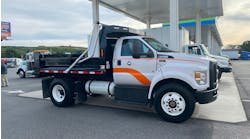Strike at Mack back on as UAW members reject contract
As of 7 a.m. Oct. 9, about 3,900 United Auto Worker members are on strike at Mack facilities in three states. Mack previously proposed a five-year collective bargaining agreement that was sent to a vote for ratification last week by UAW President Shawn Fain. The majority of workers did not agree it was a fair deal, with 73% voting it down, according to a letter from Fain to Volvo Group, Mack’s parent company.
"I'm inspired to see UAW members at Mack holding out for a better deal, and ready to stand up and walk off the job to win it," said Fain, who is also negotiating for members striking at Ford, General Motors, and Stellantis sites.
Mack’s union workers striked for two-weeks in 2019 before the contract that just expired was ratified. Negotiations have been ongoing for about three months, and it looked like Mack avoided the same fate as Detroit’s Big Three automakers.
According to Mack, the rejected deal offered:
- 10% general wage increase in year one for all employees
- a compounded 20% increase to general wages over five years
- guarantee of no increases in health insurance premiums through the term of the contract
“The union remains committed to exploring all options for reaching an agreement, but clearly we are not there yet,” Fain said. He cited several subjects that “remain at issue,” including: wages increases and progression, healthcare, scheduling, overtime, and overall job security,
The strike affects 3,900 employees at Mack sites in Pennsylvania, Maryland and Florida. According to the UAW, members will first safely shut down operations to prevent damage to Mack’s equipment and builds. All of Mack’s North American products are made in the United States
“We are surprised and disappointed that the UAW has chosen to strike, which we feel is unnecessary,” said Mack President Stephen Roy in a release. “We clearly demonstrated our commitment to good faith bargaining by arriving at a tentative agreement that was endorsed by both the International UAW and the UAW Mack Truck Council.
Another reason for Roy’s surprise was that UAW leadership touted the tentative agreement “a record contract for the Heavy Truck industry,” he noted.
All that deal did now was postpone the strike that would have occurred when the last contract expired Oct. 1. At the time, Roy lauded the apparent compromise Mack reached with the UAW. He asserted that the new contact provided UAW members with “significantly increased wages and continue first-class benefits for Mack employees and their families,” while also “allow[ing] the company to successfully compete in the market, and continue making the necessary investments in our people, plants, and products."
Over the last decade, Mack invested $435 million in facility upgrades and expansion, with $1 billion more currently being invested into the products, which include several truck models, as well as engines, transmissions, and suspensions. Mack has two battery electric vehicles: the Class 8 LR Electric, now proving its value in the refuse market; and the not-yet-in-production Classes 6-7 MD Electric for the medium-duty segment.
To get workers back in the plants, Mack now must find a way to reach a compromise with the UAW and still provide cost-competitive equipment.
“We are committed to the collective bargaining process, and remain confident that we will be able to arrive at an agreement that delivers competitive wages and benefits for our employees and their families, while safeguarding our future as a competitive company and stable long-term employer,” Roy said. "We look forward to returning to negotiations as soon as possible.”




